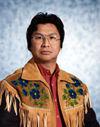Mr. Speaker, I have returned from attending a two-day meeting in Toronto of Ministers responsible for aboriginal affairs, along with leaders and representatives of aboriginal organizations.
The meeting was a good opportunity to build relationships between governments and aboriginal leaders, aboriginal organizations, and to discuss issues of long-standing concern. Those issues included self-government and improved delivery of services to or by aboriginal people.
All provinces, except Quebec, were represented at the meeting. Representatives from the Assembly of First Nations, the Inuit Tapirisat of Canada, the Metis National Council and the Native Council of Canada also attended. The federal Minister was invited, but he declined at the last minute.
Mr. Speaker, presentations and discussions at the conference focused on a number of items. For instance: the need for the federal government to meet its constitutional, treaty and legislative responsibilities in negotiations and financial arrangements with aboriginal people; responsibilities for off-reserve aboriginal people; and ways to deal with potential conflict of laws in respect to federal, provincial and aboriginal governments.
We also focused on a couple of other items: the need for the federal government to carry out its jurisdictional authority for Indian, Inuit and Metis peoples and lands reserved for them; and the powers required for aboriginal self-government.
Mr. Speaker, on the matter of self-government it was interesting to note that in their opening remarks seven of the nine provinces and both territories stated their support for the entrenchment of an inherent right to self-government in the Canadian Constitution.
As a matter of fact, delegates later supported the need for a seminar that would investigate various self-government arrangements. It was agreed that a meeting would take place in Whitehorse this summer. The seminar would be followed by a second Ministers' conference this fall in Alberta. Thank you.
